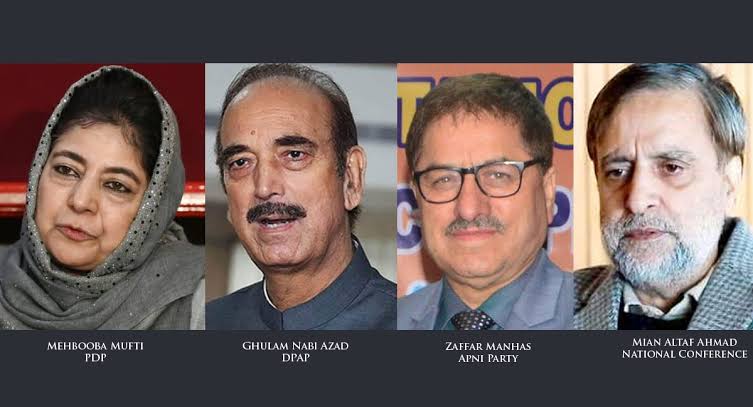On May 25th, the Anantnag-Rajouri Parliamentary Constituency will hold its elections, featuring key contenders such as Zaffer Iqbal Manhas from the Apni Party, Mehbooba Mufti of the PDP, and Mian Altaf Larvi of the JKNC.
In the backdrop of these elections, the BJP-led Central Government’s recent granting of Scheduled Tribe status to the Pahari community, which predominantly inhabits the twin border districts of Poonch and Rajouri, has brought new political dynamics into play. This development has brightened the prospects of the saffron party in the newly carved Rajouri-Anantnag Parliamentary constituency, which has a 90 percent Muslim population and nearly 10 percent Hindus, including Kashmiri Pandits. Established in 2022 after the delimitation of Assembly and Parliamentary constituencies following the reorganization of the erstwhile Jammu and Kashmir State into two Union Territories (J&K and Ladakh), the Rajouri-Anantnag Lok Sabha segment spans 18 Assembly segments and has approximately 14 lakh voters, with almost 50 percent being Kashmiri Muslims, 28.5 percent Pahari, and 21.5 percent Gujjars. Among these voters, around 1.5 lakh are Hindus, including approximately 1.15 lakh Pahari Hindus, 20 thousand Kashmiri Pandits, and nearly 15 thousand Sikhs.
Zaffer Iqbal Manhas, who belongs to the Pahari community, is heavily relying on support from his community and BJP voters in the Rajouri-Poonch areas. He has also garnered substantial backing from various regions in the constituency, including Anantnag, Pahalgam, Shopian, and Kokernag. This support is bolstered by the presence of two former MLAs, a municipal chairman, several Block Development Council chairpersons, and the brother of a prominent NC leader from Bijbehara in these areas. In Shopian, his influence is further strengthened as his own son serves as a District Development Council (DDC) member. Additionally, there is a possibility of potential support from Jamaat-e-Islami, as Home Minister Amit Shah’s recent visit appears to be aimed at mobilizing this group. This is now evident from the recent statements made by JeI leaders. This diverse network of political allies, familial connections, and possible new endorsements provides Manhas with a significant base of support as he vies for a win in the upcoming elections.
The second main candidate is Mehbooba Mufti, the former Chief Minister. She leverages an emotional appeal by campaigning as an “Abla Nari,” portraying herself as the lone survivor of the former stalwart political figure of South Kashmir, the late Mufti Mohammad Sayeed. According to her, she was disheartened by the BJP’s withdrawal of support to her coalition government in 2018. Despite many senior leaders and former MLAs leaving her party after the abrogation of Article 370, she still resonates emotionally with her constituency. From 2002 to 2014, Mehbooba Mufti and her party enjoyed full support from Jamaat-e-Islami. However, the situation may be different now, as Jamaat-e-Islami remains a banned party by the Government of India and may support a BJP-backed leader instead. A significant number of young leaders are placing their hopes on her leadership. However, her reputation for having an angry and arrogant nature may limit her appeal in the Rajouri and Poonch areas of the constituency. As the lone female candidate, Mehbooba Mufti is likely to garner a sizable number of votes from female voters in Anantnag, Kulgam, and Shopian areas. She enjoys substantial support in the Watchi, Bijbehara, Devsar, Shangus-Seer, and Anantnag areas of the constituency. Her campaign, underscored by both emotional appeal and strategic outreach, positions her as a formidable contender in this election.
The third important contender is Mian Altaf Larvi, who belongs to the strong religious group of the Gujjar/Bakerwal community. He is more of a religious leader than a political one, and his potential support lies within this community. However, the National Conference (NC) has a strong traditional vote bank and cadre base in all areas. Mian Altaf has a strong base in Noorabad, Kulgam, Anantnag, Devsar, and Kokernag. Additionally, he is representing the INDIA Alliance, so Congress and CPIM are mobilizing support for him. Notably, CPIM has a strong base in Kulgam district, where they have a committed ideological vote base. Mian Altaf’s candidacy brings a unique dynamic to the election, combining religious influence with a solid organizational backing from the NC and allied parties.


